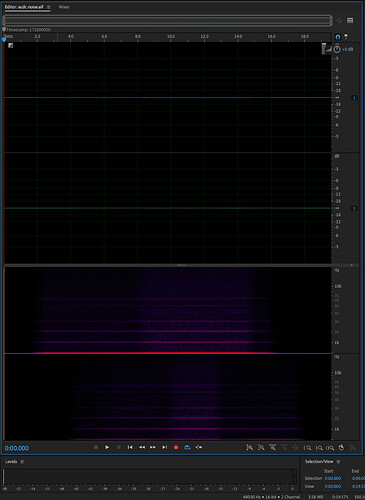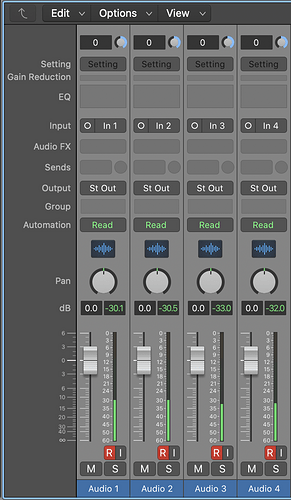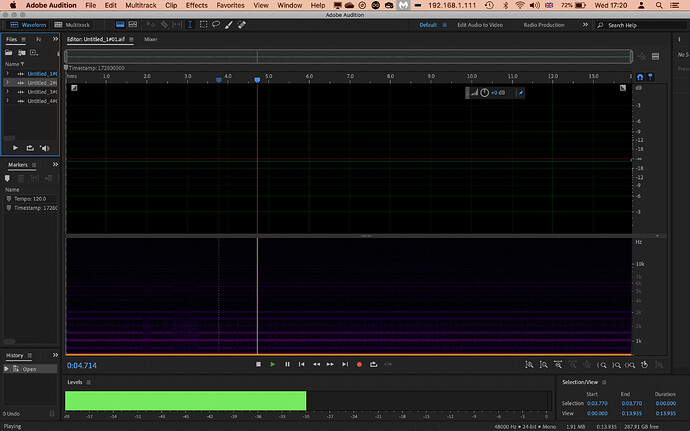Hi everyone,
I’m starting to work with the AC/DC (v. 22.5.0) as an alternative to the Expert Sleepers ES-8.
I’ve successfully used it to output sound from Max to my modular. However I’ve encountered a clock noise problem using the AC/DC as an interface to record audio from the modular to Logic (10.6.1) on my MBPro (13in 2020 4 TB3 ports, running 10.15.7). I’ve set up a Logic session at 48KHz and recorded a blank test file with nothing plugged into the inputs of the AC/DC. I hear a kind of harmonic clock noise as I turn up the input trim pots. I exported the recording, and looking at the spectogram in Adobe Audition, we see the noise - its trajectory follows exactly how I turned up the pots - first Ch 1, then Ch 2, first up to 12 o’clock, then to max, and back. I’ve tried moving the module to another skiff with different power source, and same problem, I don’t have noise anywhere else in the system, and doing the exact same test with the ES-8 gives a clean recording… What could be happening?
best, Atau
Hi, I don’t have AC/DC but I would suspect the noise might be coming from the USB ground connection. Did you use ES-8 with USB or with ADAT? You could try unplugging your MB from the wall and check if the noise disappears then.
Hi,
I used the ACDC and ES-8 in exactly parallel conditions - with USB. I’ve now tried every combination, putting an opto-isolator inline with the USB, trying different skiffs and power supplies, insulating the module from any other electrical contact with other modules, running the host computer on battery, and the artifact remains. I tried with two ACDC’s (serial 191 and 250)
It is harmonic at multiples of 1KHz, and is dependent on the input gain setting on the front panel knobs, and at unity gain (12 o’clock), is about -30dB, and at max gain, can go up to -18dB. I made a series of recordings and screenshots here. The filenames give the serial number and also the condition, and each file generally shows a sweep of the gain knobs for Ch 1 and 2. I’ve put the files here https://drive.google.com/drive/u/1/folders/1f9noaaT1r5M0GiCiWgSXza5I7TscWwVr
Thank you Atau for the thorough report. The levels of noise you describe are definitely not normal.
I will do some testing once I’m back in the lab (i.e my garage), I’m away at the moment so it will be end of next week. I’ll produce some graphs of the noise floor and SNR, and we can compare.
Meanwhile could you please try, as an experiment, loading this pass-through patch. Don’t store it pls!
It will render the gain controls useless, and you will probably only have two channels working.
With the patch loaded, see if you still get the same noise. If not then the problem is likely to be with the gain controls.
You can revert to normal by selecting patch 1 from the device page.
I get this 1KHz + harmonics signal too, but it seems to have lower level. It does pick up something else from my computer, might be related to LED blinking as it’s happening every 0.8 seconds or so and has higher noise level then described here. I’ll test it in a few days with a USB splitter that separates power/ground and data lines into separate connections to see if it can eliminate the issue.
I would be surprised if bypass patch has any significant difference from default patch as unity gain, because the ADC are smoothed and also we should get 3KHz root in this case (48KHz SR / 16 BS). However, it might be beneficial to interpolate volume using FloatArray::scale in this patch.
Meanwhile, I was surprised to hear from @atau that v.22.5.0 is usable - was it installed from Github or built manually? It only works for me if I build it myself, but official release file breaks USB functionality.
hi @mars @antisvin I have finally had time to sit down with the AC/DC and try the patch Martin sent above, that bypasses the gain. As Antis suspected, this patch doesn’t change anything. When I plug the AC/DC via USB to my laptop and run Logic, I see -30dB indicated on inputs 1-4. When I record this (no input AC/DC) and export the files to look at in Audition, we see the harmonic signal in the sonogram, as before. I attach two screenshots.
With a cheap ground isolator the noise desapears.


